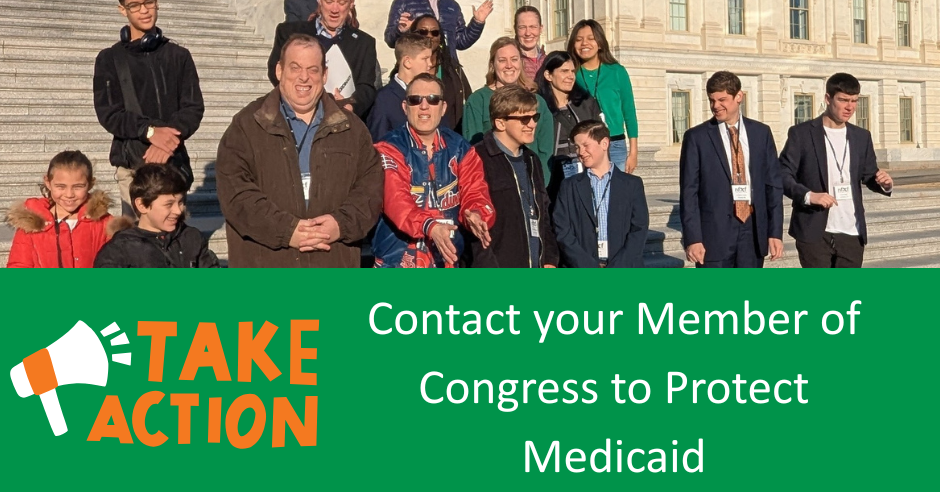Advocacy is key to supporting the mission of the NFXF — to serve the entire Fragile X community, enabling them to live their best lives by providing knowledge, resources, and tools until, and even after, more effective treatments and a cure are achieved.
New to advocacy? Need a refresher on the terminology? Our partner, the Everylife Foundation, has a comprehensive glossary of policy and advocacy terms you can use.
Advocacy Day
Our next Advocacy Day is scheduled for February 23-24, 2026.
The pillar of our advocacy work is Advocacy Day. Every spring, for over 20 years, we gather in Washington, DC, in a concerted, joint effort to raise awareness of Fragile X in Congress and to ask for research funding and policies that provide the opportunity for a better life for those living with Fragile X.
It is easy to think your voice doesn’t matter — it does. Voices from home are the loudest! They know you are a voter. Showing up, telling your story, educating them, and showing them practical ways they can help is what makes a difference!
Families, self-advocates, caregivers, siblings, doctors, and researchers come together to advocate for the entire Fragile X community and work toward our collective goals.
What We’ve Accomplished
 Research
Research
We advocate for investments by the federal government in Fragile X research and policies that spur drug and treatment development for rare disorders.
Ensuring successful Fragile X research is a multi-faceted approach that includes participation from researchers and families, federal policies, and private, institutional, and federal investments. The investment by the federal government over the past two decades has exceeded $725 million — much of which is attributed to the work of NFXF Advocates. Specifically:
- Over $725 million in Fragile X research between the National Institutes of Health (NIH), the Centers for Disease Control and Prevention (CDC), and the Department of Defense (DOD).
 National Institutes of Health (NIH) — $112 million in active awards specific to FMR1-related conditions and disorders through the NIH.
National Institutes of Health (NIH) — $112 million in active awards specific to FMR1-related conditions and disorders through the NIH. Centers for Disease Control and Prevention — $2 million per year from the CDC, which funds the FORWARD-MARCH research program.
Centers for Disease Control and Prevention — $2 million per year from the CDC, which funds the FORWARD-MARCH research program.- Department of Defense — Over $20 million in grants through the DOD program since 2010
- A comprehensive NIH research plan to guide research targeting all Fragile X-associated disorders.
- The Orphan Drug Act to encourage private companies to repurpose drugs approved for other disorders for rare diseases/disorders.
We have also supported:
- Friends of NICHD Letter: Requesting continued support of NIH and NICHD funding.
- The Defense Health Research Consortium: Requesting continued funding of the Congressionally Directed Medical Research Programs at the DOD.
 Better Lives
Better Lives
Everyone with an intellectual and developmental disability has the same right to the pursuit of life, liberty, and happiness. We work for policies to make that possible.
We like to say if you have met someone with Fragile X, you have met someone with Fragile X. Each individual is unique, with unique needs.
Our goal is to promote policies that make better lives possible and give each family an opportunity to choose the path that they feel is best for them. We recognize the importance of social support programs, such as SSDI, Medicaid, and Medicare, the importance of giving families opportunities to save additional resources, and how essential it is for individuals to find work meaningful to them. Our successes include:
- ABLE Accounts, which are tax-deferred savings accounts for adults living with disabilities, similar to 529 college savings accounts.
- ENABLE provisions were made permanent in the One Big Beautiful Bill
- The ACE Kids Act to help children on Medicaid with “complex medical conditions,” receive better, coordinated care, including across state lines.
- The RAISE Act to improve federal, state, and local policies for caregivers of adults.
We have also supported:
- Continued, increased access to telehealth beyond the pandemic.
- The HEADS Up Act to make more specialists available under Medicaid and community-based health centers specific to IDD (intellectual and developmental disabilities) by designating intellectual and developmental as a medically underserved population.
- The Charlotte Woodward Organ Transplant Discrimination Prevention Act prohibiting discrimination on the basis of mental or physical disability in cases of organ transplants.
 Awareness in Congress
Awareness in Congress
Before a member of Congress can help, they have to know about Fragile X. That is a key component of our advocacy — raising awareness of Fragile X among the policymakers.
NFXF Advocates have been very successful at educating Congress! Visiting offices, sharing personal stories, introducing Congress to self-advocates, and more demonstrates to Fragile X is real, it affects their constituents, and there are ways they can help. This work and our asks are continuous, including:
- Congressional Fragile X Caucus: Members of Congress can join to demonstrate their support of families living with Fragile X. The co-chairs work each year to raise awareness and to support the annual appropriations request for research.
- Gregg and Livingston Harper Internship Program for Individuals with Intellectual Disabilities: When Gregg Harper served in Congress, he established an internship program in the House for individuals with IDD. The mission was two-fold: give these individuals a chance to serve and raise awareness of IDD among the staff and members. It continues to this day, and at least two individuals with Fragile X have participated, and upon his retirement, was renamed the Gregg and Livingston Harper Internship Program for Individuals with Intellectual Disabilities. Livingston is Gregg’s son and has Fragile X syndrome.
Legislation We’re Currently Monitoring or Supporting
Here, we list current legislation that has been introduced and that we are monitoring, including policies that may provide the opportunity for a better life for those living with Fragile X.
This bill requires state Medicaid programs to establish a process where qualifying out-of-state providers may temporarily treat children without undergoing additional screening requirements.
Why is this ACT (H.R.1509/S.752) important? Sometimes individuals living with Fragile X-associated conditions must travel to another state to see a specialist or visit a specialty clinic. If the individual is part of a Medicaid program, this act will help to make a new, faster way for doctors to become a part of another state’s Medicaid program. Everyone deserves the best care — regardless of who they are, where they live, or their income. This bill was unanimously passed out of the House Energy & Commerce Committee! We are hopeful it will be taken up by the full House of Representatives soon.
To require the Administrator of the Centers for Medicare & Medicaid Services and the Commissioner of Social Security to review and simplify the processes, procedures, forms, and communications for family caregivers to assist individuals in establishing eligibility for, enrolling in, and maintaining and utilizing coverage and benefits under the Medicare, Medicaid, CHIP, and Social Security programs respectively, and for other purposes.
This bill combines the original Give Kids a Chance Act and the Creating Hope Reauthorization Act, building on successful strategies to advance drug development for pediatric cancer and rare diseases. It aims to reauthorize and extend the FDA Rare Pediatric Disease Priority Review Voucher (PRV) program, which has led to 53 new treatments for pediatric rare diseases. The Act also includes a provision to award orphan drug exclusivity based on a product’s FDA-approved indication, encouraging investment in treatments for smaller patient populations and providing limitations on exclusive approval or licensure of orphan drugs to help promote drug development in rare diseases.
This bill allows an eligible caregiver a tax credit of up to $5,000 for 30% of the cost of long-term care expenses that exceed $2,000 in a taxable year. The bill defines eligible caregiver as an individual who has earned income for the taxable year in excess of $7,500 and pays or incurs expenses for providing care to a spouse or other dependent relative with long-term care needs.
Expands tax credits and deductions that are available for employers who hire and retain employees with disabilities.
Learn more: S.3076
ENABLE provisions were made permanent in the One Big Beautiful Bill, making permanent three tax provisions relating to ABLE accounts established to assist disabled individuals, specifically:
- provisions allowing increased contributions to such accounts,
- the allowance of a retirement savings contribution tax credit of up to $1,000 ($2,000 per married couple filing jointly) for contributions to an ABLE account, and
- allowing a tax-free rollover from a qualified tuition program (529 plan) to an ABLE account.
This bill increases resource limits used to determine eligibility for the Supplemental Security Income (SSI) program. SSI is a federal assistance program that provides monthly cash payments to aged, blind, or disabled individuals with limited income and resources.
Specifically, the bill increases the resource limits from $2,000 to $10,000 for individuals and from $3,000 to $20,000 for married couples. The bill annually adjusts the limits for inflation.
Addresses employment standards for people with disabilities.
The bill directs the Department of Labor to award grants to states and certain eligible entities to assist them in transforming their business and program models to support individuals with disabilities by:
- providing competitive integrated employment,
- assisting disabled individuals in finding and retaining work in such employment,
- providing integrated employment and integrated community participation and wraparound services for such individuals, and
- ensuring that such services comply with federal regulations for individuals receiving home and community-based services.
The bill also prohibits the issuance of new special certificates that allow payment of subminimum wages to disabled individuals and phases out existing certificates over a four-year period.

How Can You Help?
Join us each spring for Advocacy Day. We’ve been at it for more than 20 years and can tell you it is one of the most important ways you can help make a difference.
Join our private Facebook group for advocates. It’s where we all keep up on the latest news, share knowledge and experiences, and coordinate advocacy — and we have fun! Join today.
Stay up-to-date via email. Make sure you have the latest on our Advocacy program by signing up for our advocacy emails (choose Advocacy & Public Policy), including educational information, updates, and requests to take action. Subscribe today.
 Download Your State’s Fact Sheet
Download Your State’s Fact Sheet
For use on Advocacy Day (or any day), we created these one-pagers to help introduce someone to Fragile X, including the number of affected constituents who are currently residing in each state.
Alabama
Alaska
Arizona
Arkansas
California
Colorado
Connecticut
Delaware
Florida
Georgia
Hawaii
Idaho
Illinois
Indiana
Iowa
Kansas
Kentucky
Louisiana
Maine
Maryland
Massachusetts
Michigan
Minnesota
Mississippi
Missouri
Montana
Nebraska
Nevada
New Hampshire
New Jersey
New Mexico
New York
North Carolina
North Dakota
Ohio
Oklahoma
Oregon
Pennsylvania
Rhode Island
South Carolina
South Dakota
Tennessee
Texas
Utah
Vermont
Virgina
Washington
West Virginia
Wisconsin
Wyoming
What Are Federal Budgets and Why They Matter
Each year, the president submits a budget to Congress that outlines their spending priorities. These signal their policy priorities too. Because they want to show a balanced budget, often other agency budgets will be reduced — even if they may not support it — because they know that Congress won’t do that. A recent example is significant reductions to the NIH and CDC proposed budgets.
As you hear about the budget, keep these truths in mind:
- Congress DOES NOT vote on the president’s budget. It is the official suggestion to Congress for spending for the following fiscal year. But it is just a suggestion.
- The budget is a messaging document. The president and his cabinet, members of Congress, and groups use what is or is not included in the budget to move their agenda, stop something they don’t like, or motivate their members to be involved.
- We work to keep the budget in its proper perspective and to use the appropriations process in Congress to secure our Fragile X research funding priorities.
That brings us to Congress and appropriations.
One-third of federal spending is called non-mandatory. That means Congress sets the spending levels each year — this is called appropriations. Our constitution mandates that all spending originates in the House of Representatives. Congress passes legislation setting the spending levels and the President signs or vetoes the whole bill. There are 12 appropriations bills — each one covers multiple agencies that are generally related. We focus on the Defense and the Labor-HHS bills.
The Appropriations Committees start their work in January. Individual members can submit their requests for spending into the committees in March and April (the deadlines vary by the subcommittee and the year). We gather together for our Advocacy Day in late February-early March to ensure we have plenty of time for our Congressional supporters to gain additional support and submit a join request to the Committees.
In theory, the bills are signed by the president before October 1, which is when the new fiscal year starts. If they are not, Congress has to provide temporary funding, called a continuing resolution, or the agency has to stop work (aka “government shutdown”).
Learn More
Questions?
We’re here to help, and would love to hear from you. Please email the NFXF Team at advocacy@fragilex.org.





